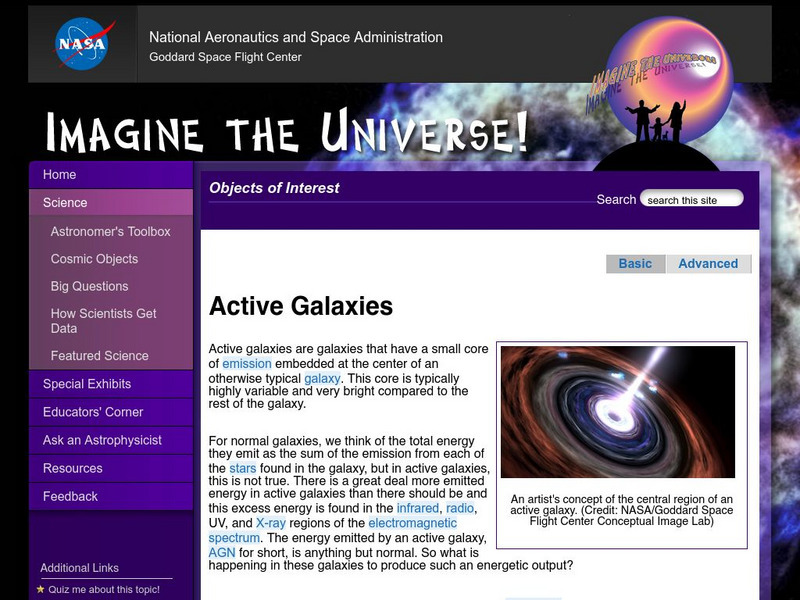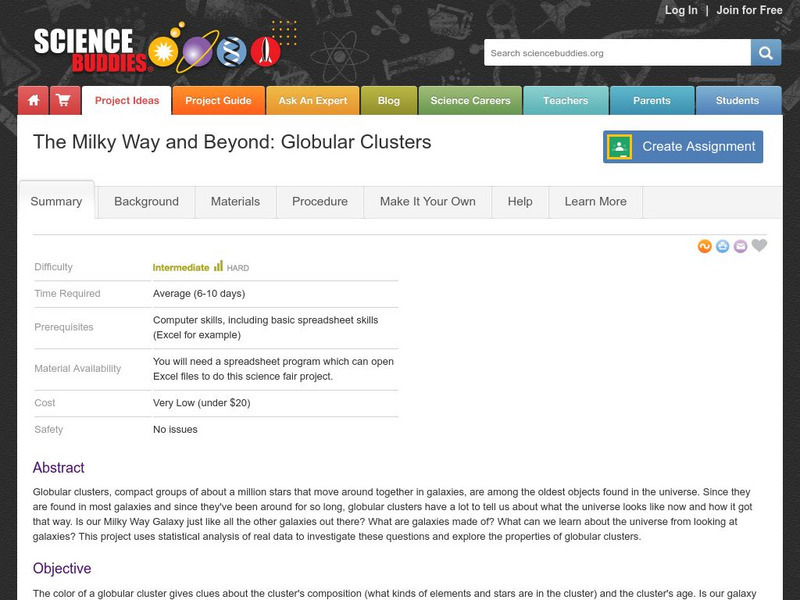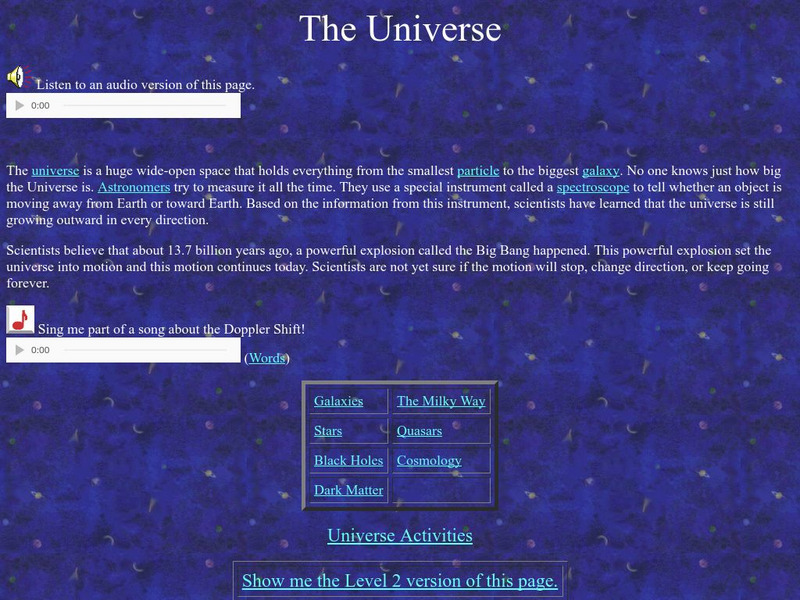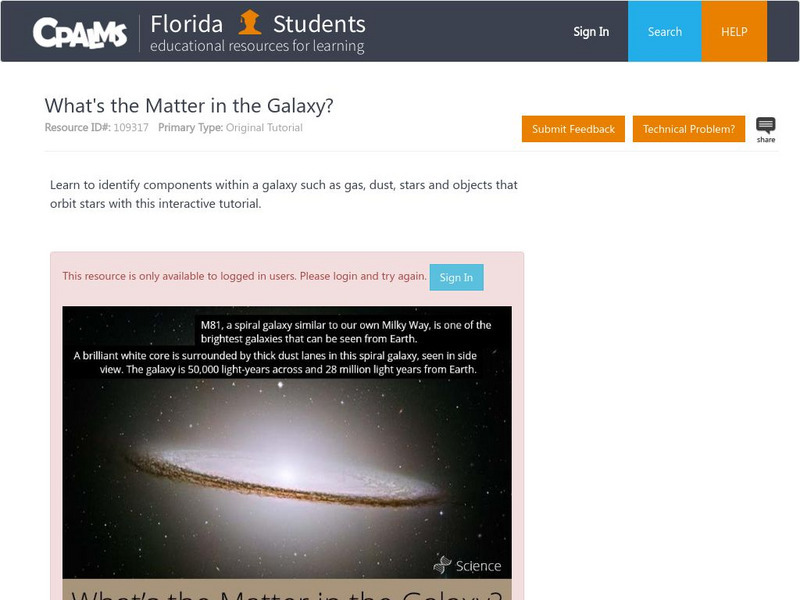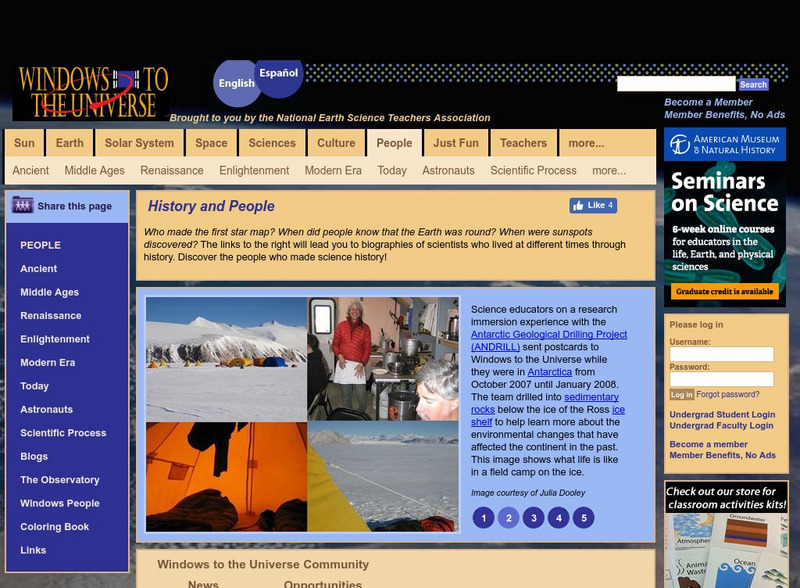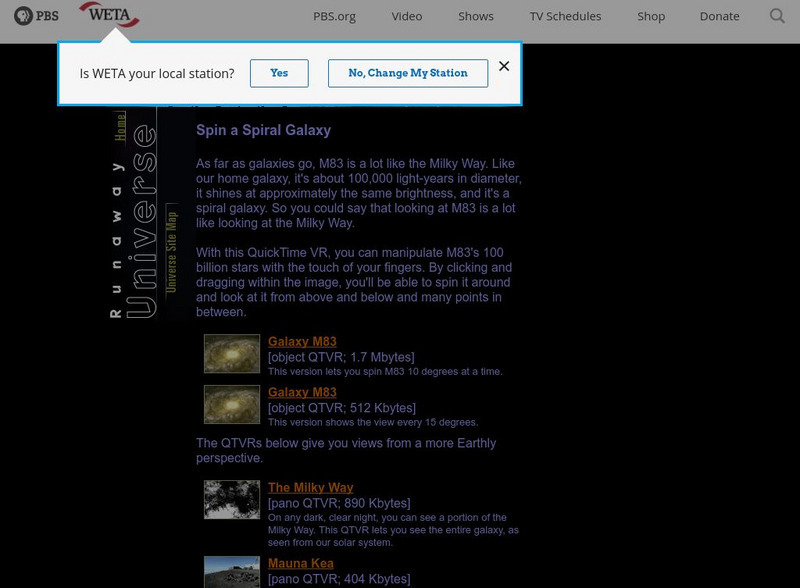Hi, what do you want to do?
Curated OER
Solar System (Lesson 2)
Eighth graders identify the objects that make up the solar system. They define new vocabulary and practice using them. They discover that the sun is a star.
Curated OER
Gamma Ray Bursts
Students study an article on Gamma Rays. In this investigative activity students study the energy and wavelengths of gamma rays and the theories behind them.
Curated OER
Powers of 10
Students explore universe, and examine how big it really is and how scientists measure the distances or sizes of things by estimating sizes of different objects and reading and writing numbers in scientific notations.
Curated OER
Periodic Table
Students identify the periodic table trends and predict material properties. They also design and conduct simple experiments and test material properties. Finally, students compare and contrast material properties and that chemical...
Curated OER
Space Facts
Students read space facts and click on the links to research more about space objects. In this space lesson plan, students read about comets, planets, the moon, and more.
Curated OER
How Long Would It Take To Travel To the Stars?
Students consider the amount of time that it would take to get to the star, Sirius using various modes of transportation, some practical and some whimsical. The practicality of physically going to another star system is explored in this...
Curated OER
Pea Brain! Explorations in Estimation
Pupils estimate how many peas fit in a container. In this science lesson, students calculate the weight of a pea and record it. They use this data to calculate how many peas fit in a human brain.
Curated OER
Extraterrestrial Communication: Can We Talk to Anybody Out There?
Learners examine the possibilities of communication with other living organisms within our solar system through research and hands on activities, as well as observing and analyzing teacher demonstrations.
Curated OER
Solar System
In this solar system, students review information about the planets found in our solar system. Students complete 15 fill in the blank questions and then find the 9 planets in a word search.
Curated OER
The Planet Earth
Students explore the planet Earth, outer space, and Earth's axis. They demonstrate reading comprehension skills, including literal meaning, inference and critical analysis.
Curated OER
Beam Me Up Scotty#153
Students analyze population and land use data to predict future environmental problems. They use fictitious data for this exercise while pretending that they are helping aliens who have come to them for advice.
Curated OER
The Mathematical Fingerprint of Our Solar System
Pupils study the beautiful mathematical model unique to our solar system.
Curated OER
Mixed Prepositions
In this interactive prepositions worksheet, students practice using prepositions in sentences. Students choose the correct preposition for each blank in the passage. There are fifteen in all.
Curated OER
Journal of the Stars
Young scholars receive balloons representing the "Life Cycle of the Stars." As the attached script is read, students follow the directions for the color of balloon they are given. Young scholars chart the results for their star. They...
Curated OER
Astronomical Scales
Young scholars describe the different units of measurement. In this space science lesson, students calculate astronomical distances using a scale. They explain the significance of using scientific notation in expressing very small...
NASA
Nasa: Imagine the Universe: Active Galaxies and Quasars
Describes quasars as being classified within the category of an active galaxy. A description of the emergence of high-energy. Definitions of key words are provided.gamma-ray quasars as an important component of the gamma-ray sky.
Science Buddies
Science Buddies: The Milky Way and Beyond: Globular Clusters
Globular clusters, compact groups of about a million stars that move around together in galaxies, are among the oldest objects found in the universe. Since they are found most galaxies and since they've been around for so long, globular...
NASA
Nasa Star Child: The Universe (Level 1)
This site provides an introduction to the origin of the universe for the young child and the Big Bang theory. There is also a song about the Doppler Shift. Vocabulary glossary and printable version available.
Space Telescope Science Institute
Nasa: Hubble Space Telescope: Galaxies
At this site from HubbleSite you can learn all about galaxies and black holes. Click on the movie link and discover how old the universe is or study about what happens when two galaxies collide!
CPALMS
Florida State University Cpalms: Florida Students: What's the Matter in the Galaxy?
A tutorial that looks at the components within a galaxy such as gas, dust, stars and objects that orbit stars. A PDF file of the tutorial is available.
National Earth Science Teachers Association
Windows to the Universe: History & People
Biographies of people throughout history who looked at the sky and wondered what was there. Links to a detailed description of the planets and interactive activities.
Space Telescope Science Institute
Nasa: Hubble Space Telescope: Universe
At this site from HubbleSite you can discover the universe by taking a look back toward the beginning of time. Site contains links to information on planets, stars, galaxies, and much more.
PBS
Pbs: Nova Online: Galaxies, Clusters, and Superclusters
PBS site explores these building blocks of the universe as well as their various types and clusters.
PBS
Pbs Nova Online: Spin a Spiral Galaxy
PBS site provides various views of spiral galaxies. (Quick Time required) With this technology, you can manipulate the image to spin it around and look at it from various angles.




















